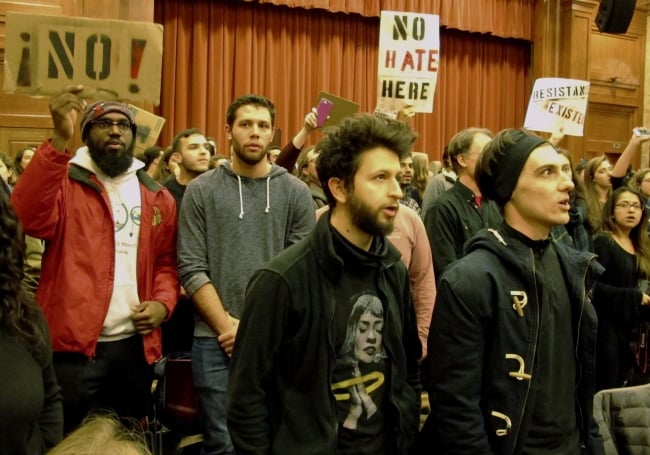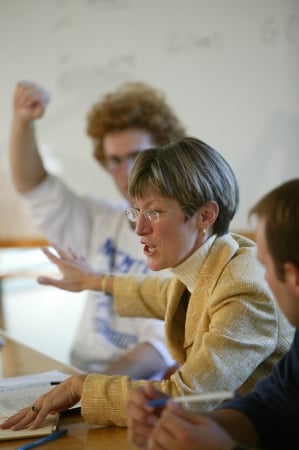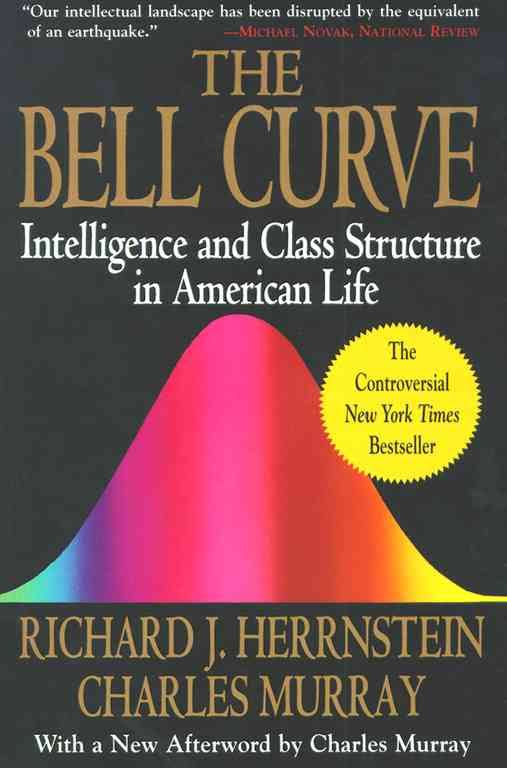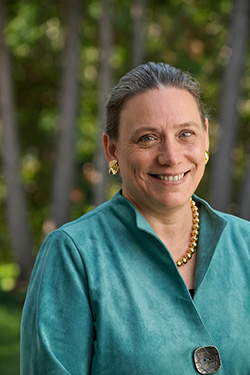You have /5 articles left.
Sign up for a free account or log in.

Middlebury students protest during Charles Murray's aborted public lecture.
AP Photo/Lisa Rathke
 Thursday was "the saddest day of my life," wrote Allison Stanger, a prominent political scientist who is a professor at Middlebury College, in a Facebook post on Friday. Thursday was the day that Stanger was scheduled to moderate the question period after a lecture by Charles Murray, a scholar at the American Enterprise Institute best known for being co-author of The Bell Curve. But the public lecture wasn't to be, as students turned their backs on Murray and shouted and chanted for such a long period that Murray couldn't speak.
Thursday was "the saddest day of my life," wrote Allison Stanger, a prominent political scientist who is a professor at Middlebury College, in a Facebook post on Friday. Thursday was the day that Stanger was scheduled to moderate the question period after a lecture by Charles Murray, a scholar at the American Enterprise Institute best known for being co-author of The Bell Curve. But the public lecture wasn't to be, as students turned their backs on Murray and shouted and chanted for such a long period that Murray couldn't speak.
When Murray couldn't speak, the college moved him and Stanger to another location to livestream a discussion. But after that event, some of the protesters surrounded them as they were leaving. Some shoved Stanger and yanked her hair with such force that she needed to wear a neck brace the next day.
That a professor was physically attacked has added to the soul-searching at Middlebury. Stanger, politically liberal and far from Murray on most issues, agreed to a student request to moderate the question period because, she wrote, she wanted to encourage students, and looked forward to a good debate.
She wrote on Facebook (in a post she authorized Inside Higher Ed to quote) that the event went terribly wrong.
"I want you to know what it feels like to look out at a sea of students yelling obscenities at other members of my beloved community. There were students and faculty who wanted to hear the exchange but were unable to do so, either because of the screaming and chanting and chair pounding in the room, or because their seats were occupied by those who refused to listen and they were stranded outside the doors," she wrote.
"I saw some of my faculty colleagues who had publicly acknowledged that they had not read anything Dr. Murray had written join the effort to shut down the lecture. All of this was deeply unsettling to me. What alarmed me most, however, was what I saw in student eyes from up on that stage. Those who wanted the event to take place made eye contact with me. Those intent on disrupting it steadfastly refused to do so. It was clear to me that they had effectively dehumanized me. They couldn’t look me in the eye, because if they had, they would have seen another human being. There is a lot to be angry about in America today, but nothing good ever comes from demonizing our brothers and sisters."
To many at Middlebury and elsewhere, the idea that students shouted down a speaker was shocking, and the idea that some of those protesting surrounded a car and stomped on it was even more upsetting. But as Stanger's account has circulated on campus, people there have been particularly distraught by a physical attack on a respected professor.
Of the attack on her, she wrote, "When the event ended and it was time to leave the building, I breathed a sigh of relief. We had made it. I was ready for dinner and conversation with faculty and students in a tranquil setting. What transpired instead felt like a scene from Homeland rather than an evening at an institution of higher learning. We confronted an angry mob as we tried to exit the building. Most of the hatred was focused on Dr. Murray, but when I took his right arm both to shield him from attack and to make sure we stayed together so I could reach the car, too, that’s when the hatred turned on me.
"One thug grabbed me by the hair and another shoved me in a different direction. I noticed signs with expletives and my name on them. There was also an angry human on crutches, and I remember thinking to myself, 'What are you doing? That’s so dangerous!' For those of you who marched in Washington the day after the inauguration, imagine being in a crowd like that, only being surrounded by hatred rather than love. I feared for my life."
The details about Stanger are not the only new information coming out about what happened Thursday.
Middlebury officials now say that a small group of six to 12 people who appeared not to be students were involved in the attack on the car and Stanger. These people were dressed in black and wore masks. Earlier some of them tried to enter the lecture hall and were turned away. Those who shouted down Murray were students, but those who attacked the car (a group that included students) appeared to be led by the outside group (whom Middlebury officials said appeared older than most of the college's students). College officials called the town police when the car was attacked, but the attackers had run away by the time police officers arrived. No one was arrested. College officials said the size and intensity of the protest surprised them.
The reports about the nonstudents, dressed in black and with their faces covered, are similar to those from the University of California, Berkeley, and elsewhere about anarchist "black bloc" protests that have turned up on some campuses.
With Middlebury investigating what happened -- including illegal acts in the attacks on the car and the professor, as well as violations of college policies -- students have not come forward with their names to claim responsibility for what happened, or to discuss their views. Video and numerous photographs show many identifiable students during the protest in the lecture hall. Some students anonymously posted a statement on Beyond the Green, a blog about the college. The authenticity of the statement cannot be verified, but another Middlebury blog also posted it, and both blogs maintain that they received the statement from students involved in the protest. The statement defends the protests and offers a different version of events, blaming the college for the altercations for being too aggressive in trying to protect Murray.
As to what happened to Stanger (her account has been confirmed by the college), the statement says, "Professor Stanger’s hair was not intentionally pulled but was inadvertently caught in the chaos that Public Safety incited. It is irresponsible to imply that a protester aggressively and intentionally pulled her hair." The statement also defends the idea that it was appropriate to block Murray from speaking because the students view him as racist.
Some faculty members who spoke out against the Murray invitation are also concerned about what happened. Michael Sheridan, chair of anthropology and sociology at Middlebury, said he would have preferred for Murray not to have been invited. Once the invitation was made, he argued that it shouldn't have been a standard lecture but more of a structured debate.
He said he stood silently with his back to Murray and then left the room, and that he was "shocked and dismayed" by what happened to Stanger. "The loud student protest was ethically wrong and a strategic error," he said via email. "I told some students (who I thought to be in touch with the leadership) that silent, nonviolent resistance was the best way forward."
UPDATE: Murray on Monday published his account of what happened. An excerpt on the students who blocked him from giving the public lecture: "Some were just having a snarky good time as college undergrads have been known to do, dancing in the aisle to the rhythm of the chants. But many looked like they had come straight out of casting for a film of brownshirt rallies."
'Heckler's Veto'
In some ways, the events at Middlebury reflect tensions within academe about limits that some see on free speech. Most proponents of academic freedom insist on the right of speakers to be able to deliver an address without being disrupted. To prevent a speech through shouting such as what took place at Middlebury is known as a "heckler's veto."
The tactic has been used beyond Middlebury. In one much discussed case, protesters at the University of California, Irvine, repeatedly interrupted the Israeli ambassador to the United States. In 2013, students at Brown University used repeated interruptions to block a talk by Ray Kelly, New York City's police commissioner at the time.
 At Irvine, those who blocked the speech said that their actions were justified by the Palestinian cause. At Brown, they said the New York City police department's tactics were racist. At Middlebury, students said Charles Murray's work -- especially The Bell Curve -- promotes racism. They cite the Southern Poverty Law Center, which sums him up this way: "Charles Murray, a fellow at the American Enterprise Institute, has become one of the most influential social scientists in America, using racist pseudoscience and misleading statistics to argue that social inequality is caused by the genetic inferiority of the black and Latino communities, women, and the poor."
At Irvine, those who blocked the speech said that their actions were justified by the Palestinian cause. At Brown, they said the New York City police department's tactics were racist. At Middlebury, students said Charles Murray's work -- especially The Bell Curve -- promotes racism. They cite the Southern Poverty Law Center, which sums him up this way: "Charles Murray, a fellow at the American Enterprise Institute, has become one of the most influential social scientists in America, using racist pseudoscience and misleading statistics to argue that social inequality is caused by the genetic inferiority of the black and Latino communities, women, and the poor."
The Bell Curve has indeed been widely criticized for not only its conclusions, but its methodology and for the way it considers issues of race. (This piece from Slate summarizes the criticism. A defense of the book from Murray may be found here.)
Those who defended the right of Murray to speak at Middlebury (at the invitation of a student group) said that there were many appropriate ways (asking him tough questions, educating people about the concerns about his work, or silent protest) that would have expressed their views without blocking the talk.
How Students -- at Middlebury and Beyond -- View Free Speech
Student views on free speech on campus are complicated. A recent poll of college students by Gallup found that a large majority of students support the idea that colleges should not restrict speech on campus just because some political views are controversial or unpopular.
But students distinguish between speech that is controversial and speech that they view as using slurs or stereotypes about certain racial and ethnic groups. More than two-thirds (69 percent) of students said that colleges should be able to restrict speech that uses "slurs or other language that is intentionally offensive to certain groups." Students who are female, black or Democrat were more likely than others to believe this, but solid majorities of students who are male, white or Republican also shared that view.
Many Middlebury students and faculty members say The Bell Curve is intentional hate speech. (Murray says his book is social science.) A letter in the student newspaper from a group of faculty members, published prior to Thursday's events, said, "Mr. Murray is … a discredited ideologue paid by the American Enterprise Institute to promote public policies targeting people of color, women and the poor. His work has employed a combination of eugenics and other pseudoscience that has time and time again shown to be based on false premises, inadequate research and erroneous conclusions. He is not an academic nor a 'critically acclaimed' public scholar, but a well-funded phony. His research is an insult to the intellectual integrity of Middlebury College."
The Middlebury President's Agenda and Response
 One irony of the Middlebury debate is that Laurie L. Patton (right), president there since 2015, has numerous times talked to students and faculty members about her concerns about less than full support on campus for the idea of free and open discussion. And Patton has explicitly rejected the idea that being committed to diversity is inconsistent with being committed to free speech.
One irony of the Middlebury debate is that Laurie L. Patton (right), president there since 2015, has numerous times talked to students and faculty members about her concerns about less than full support on campus for the idea of free and open discussion. And Patton has explicitly rejected the idea that being committed to diversity is inconsistent with being committed to free speech.
For example, in a December 2015 address before a town hall meeting at Middlebury, Patton said, "I want us to have an open and complex understanding of free speech. Free speech is not the opposite of inclusivity. We need both if we are to move forward in any meaningful way. In fact, the very way that we create a more inclusive community is by exercising free speech and continuing to create understanding even in the midst of difficult tension-filled conversations. If we do not exercise free speech, we will never learn what others are thinking, and we will never learn how to understand what we may have said or done that makes the world harder for someone else."
On Friday, Patton sent a letter to students and faculty members in which she apologized to Murray and Stanger and said that she was "deeply disappointed" in what had transpired. Patton attended the event, at the invitation of students, and was criticized by many (and booed at the event) for doing so, even as she criticized Murray and said she was not attending to endorse his views.
In her letter, Patton said that Middlebury "will be responding in the very near future to the clear violations of Middlebury College policy that occurred" Thursday.
"Today our community begins the process of addressing the deep and troubling divisions that were on display last night. I am grateful to those who share this goal and have offered to help. We must find a path to establishing a climate of open discourse as a core Middlebury value, while also recognizing critical matters of race, inclusion, class, sexual and gender identity, and the other factors that too often divide us. That work will take time, and I will have more to say about that in the days ahead," she wrote.
Patton added, "Last night we failed to live up to our core values. But I remain hopeful. Last evening, several students, faculty and staff representing a large spectrum of political perspectives remained in Wilson Hall to discuss the events and to talk about building bridges. Their ability to reach across differences in a rigorous but respectful way was a stark contrast to the events that preceded it. I firmly believe these are the Middlebury values that we have lived so long and that we must strive to embody in the future."
In an email to Inside Higher Ed on Sunday, Patton described her thinking on the situation as being concerned about free speech, but also many broader questions in higher education and society.
"We exist in a new common dilemma -- and we just saw it played out on our own beloved campus of Middlebury, known for its peacefulness until now. Controversial speech, or speech by a controversial person, is even more difficult in a time when the very idea of a public sphere has become so fragile. Such speech is also more difficult in a time when issues that should be shared educational values become exclusively owned by 'the left' or 'the right,'" Patton said.
She added, "I worry that in our current state, deep educational commitments, such as the vibrant exchange of ideas across international borders, or studying the history of oppression and freedom, may be impossible to share as common public goods. On college campuses, there are so many legitimate struggles playing themselves out in our own public spheres: How does one acknowledge the necessary discomfort that a liberal education must entail, while at the same time honoring and uncovering the difficult experiences of our students who have walked in the American margins? The discussion is not simply an issue of free speech rights and policies, although it must begin there. We are challenged to have a conversation about speech for which we have no blueprint. Engaged, committed speech, speech countering other speech, is so much more necessary now. And so much more painful."
A National Debate
The events at Middlebury have quickly become the subject of much national debate, with various figures saying that the events were significant and worthy of public debate.
Groups and individuals who write regularly about free speech on campus expressed deep frustration with what happened at Middlebury on Thursday. A blog post from the Foundation for Individual Rights in Education said, "FIRE will defend anyone’s right to peacefully protest and challenge any speaker or idea, but responding to speech with violence, or by shouting it down, is not acceptable …. The use of mob violence to respond to constitutionally protected expression is an affront to our nation’s liberal traditions. It must not be allowed on our campuses."
On the “Academe” blog of the American Association of University Professors, John K. Wilson wrote that the idea of shouting down speakers is morally wrong and can endanger the ability of the disadvantaged in society to have their voices heard.
"Shouting down speakers, such as the recent suppression of Charles Murray’s speech at Middlebury College by a large crowd of protesters, is wrong. Plain and simple. It’s wrong. Shouting down speakers is morally wrong, unprincipled, anti-intellectual and utterly indefensible. For a long time, I thought this was an obvious position, but it’s becoming increasing clear that some people on the left think it’s a good idea," wrote Wilson, an independent scholar who writes on free speech issues.
"What is the fundamental principle behind the idea of shouting down a speaker? Is the principle that people should have the freedom to shout down those they don’t like? By that logic, white supremacist gangs should be allowed to shout down people of color whenever they try to speak. Is the principle that a big crowd of people should get to shout down those they don’t like? Obviously, bigots can form a big crowd, too. There’s no good reason why an unpopular viewpoint should be shut down."
Wilson also argued that the protest at Middlebury helped Murray. "As a tactical matter, shouting down Charles Murray doesn’t stop racism. It reinforces the delusions of white people that they’re the victims of oppression. Censorship doesn’t refute anything Murray says, it only makes him a free speech martyr," he wrote.
Jose B. Gonzalez, a professor of English who has written sympathetically of student protesters nationally, said via email that college leaders should hesitate before criticizing the students at Middlebury who interrupted Murray. "The student protests are more than a criticism of Murray," he said. "They arise from a higher ed system that negates the existence of suppressed views. I am sure college presidents don't want to hear that their institutions aren't broken in some form, but they need to reflect on what made students take on this activism."
A Caution About What Middlebury Means
Stanger, the professor who was attacked, wrote in her Facebook post that she was concerned that people might see last week's events as being just about places like Middlebury, and not see broader societal problems reflected in the tumult at the college.
"To people who wish to spin this story as one about what’s wrong with elite colleges and universities, you are mistaken. Please instead consider this as a metaphor for what is wrong with our country, and on that, Charles Murray and I would agree," Stanger wrote.
She added, "This was the saddest day of my life. We have got to do better by those who feel and are marginalized. Our 230-year constitutional democracy depends on it, especially when our current president is blind to the evils he has unleashed. We must all realize the precious inheritance we have as fellow Americans and defend the Constitution against all its enemies, both foreign and domestic. That is why I do not regret my involvement in the event with Dr. Murray. But as we find a way to move forward, we should also hold fast to the wisdom of James Baldwin: 'Not everything that is faced can be changed, but nothing can be changed until it is faced.'"




